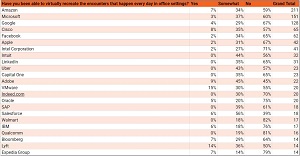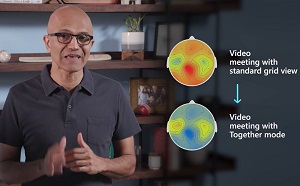News
Companies, Workers Struggle with Post-Pandemic 'New Normal'
Worker safety is the paramount concern amid rampant COVID-19, but companies and workers are increasingly struggling with questions about permanent remote work in the post-pandemic "new normal."
That new normal is coming under increasing scrutiny as potential vaccines and new experimental drug cocktails for infected patients promise some relief.
Whatever the outcome, cloud computing is certain to continue playing an integral part in helping companies and workers adjust. Studies abound on how cloud platforms like AWS, Azure and Google Cloud have handled increased traffic and enabled work-from-home schemes. Technologies such as software-defined wide-area networking (SD-WAN) have also been characterized as key to fostering remote work, along with the broader SDN.
That model may likely continue for some time. Microsoft is the latest company to allow workers to work from home permanently, according to a new The Verge report. Twitter, meanwhile, was early to jump on that bandwagon, way back in May.
But with permanent work-from-home (WFH) gaining some traction, potential drawbacks to that scheme are also coming to the forefront.
"Why does everyone want permanent WFH? Does this mean we can't go to the office if we wanted to anymore? Will offices be almost completely empty for those that do want to return? I'm a new grad, so going to the office is one of things I'm looking forward to the most, but if nobody is there, that'll be wack too. For people my age, it's definitely not a good idea to be hermitting at home 24/7 with no social interaction."
That comment, from a Google employee, comes in a recent survey from Blind, an anonymous professional network with some 3.6 million verified users.
None other than Microsoft CEO Satya Nadella addressed similar concerns front and center during his recent keynote address opening up the company's big Ignite 2020 conference, for the first time conducted entirely online.
"The current situation is quite stark," he said. "One-third of remote workers say the lack of separation between work and life is negatively impacting their well-being. Thirty percent of information workers and first-line workers say the pandemic has increased the feeling of burnout at work. And video meeting fatigue is real. Video meetings force our brains to concentrate more and carry a higher cognitive load."
To explore such issues, Blind conducted its survey early this month, garnering 2,700 responses. The survey asked:
- Have you met colleagues offline (in person) in the last 6 months?
- Does your company encourage informal digital communication? (ex. happy hours, coffee chats)?
- Have you been able to virtually recreate the encounters that happen every day in office settings?
 [Click on image for larger view.] Results of Blind Survey asking "Have you been able to virtually recreate the encounters that happen every day in office settings?" (source: Blind).
[Click on image for larger view.] Results of Blind Survey asking "Have you been able to virtually recreate the encounters that happen every day in office settings?" (source: Blind).
Key learnings coming from responses to those questions, as detailed by Blind in an Oct. 8 blog post titled "Professionals Can't Virtually Recreate the Office," include:
-
Less than one-third (28%) of professionals have met their colleagues offline (in person) in the last 6 months
- 43% of Adobe professionals have met their colleagues in person in the last 6 months
- Only 15% of Facebook professionals have met their colleagues in person in the last 6 months
-
71% of surveyed professionals state that their company encourages informal digital communication
- 96% of surveyed Uber professionals state that their company encourages informal digital communication
- 86% of surveyed Google professionals state that their company encourages informal digital communication
-
Only 6% of professionals say they have been able to virtually recreate the encounters that happen every day in office settings
- 0% of professionals at Intuit, Linkedin, Uber, and Capital One say they have been able to virtually recreate the encounters that happen every day in office settings
"It seems that although work from home is going well, the human interaction and coffee chats are impossible to recreate on Zoom calls," Blind told Virtualization & Cloud Review.
Microsoft's Nadella further addressed such concerns in his keynote. "We know that prioritizing employee well-being is core to an organization's success," he said. "It's important to understand what has been lost, what has been gained through this crisis and especially the balance between optimal organization productivity and employee well-being. Productivity just can't be about short-term employee output.
"In a world where you can easily feel isolated, organizations need to equip employees with the tools to rebuild social capital, focus and stay healthy."
 [Click on image for larger view.] Teams Together Mode Lessening the Cognitive Load (source: Microsoft).
[Click on image for larger view.] Teams Together Mode Lessening the Cognitive Load (source: Microsoft).
Microsoft's effort to equip employees with such tools include a new Together mode in its Teams collaboration software. The company is also partnering with Headspace, co-founded by a former Buddhist monk, Andy Puddicombe, to inject concepts such as mindfulness in employee workflow.
"Mindfulness and well-being are something we're seeking during these times," Nadella said in introducing Puddicombe. "The research on the benefits of mindfulness is so clear, but now it's imperative we have these options in the flow of work."
In somewhat of a contrast to companies such as Twitter and Microsoft that are increasingly embracing permanent WFH, virtualization kingpin VMware has published messaging that touts a "return-to-office" model.
But for the time being, Virtualization & Cloud Review writers are helping remote workers adjust to the current normal with articles such as:
And here's a sampling of responses to the Google user's question mentioned in the Blind survey to further shed light on how workers are feeling:
- "It depends where you live/what your commute is like/the culture of the workplace. I prefer wfh cause I have the flexibility to do my chores and errands when needed and work on my own time outside of meetings. Office life is glamorized when young but gets old fast. After just 2 years of working I don't mind not going to office ever again."
- "Make friends outside of office than you will be fine. Too much extra time in wfh"
- "Most people want to live somewhere cheaper and not have to waste time commuting everyday"
- "Majority of people want hybrid wfh/office. A more flexible lifestyle."
- "I agree, I think people are being shortsighted, and not thinking of the long term impacts on salary, promotion potential, etc. Cheaper cities are usually cheaper for a reason, and most young people I know still want to live in ny/dc/sf/etc rather than Idaho"
- "Ideally, I think companies like Twitter are ideal. They have their main office open for people to work out of anytime, but people can also work from home wherever they want. That freedom to work from anywhere is extremely valuable."
About the Author
David Ramel is an editor and writer at Converge 360.